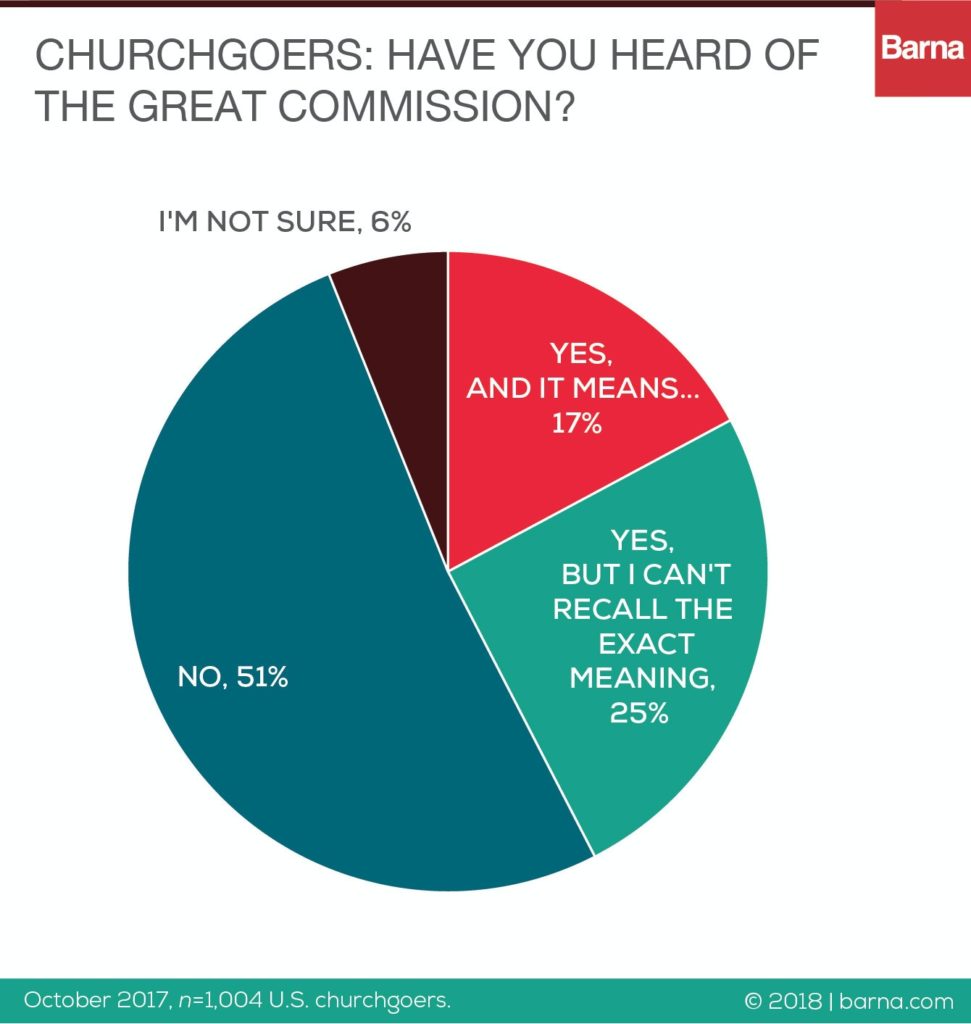One of the most exciting moments of my life was when I converted to Christ, I was full of zeal for evangelization, yet, to my dismay, when I told my friends about my conversion to Christ, they thought I was crazy. this tragically curious and I was not convinced, even though I shared the gospel with them. Finally, they asked me, “Why don’t you start a course and teach us what you learned from Jesus?” They were serious, I was delighted. We planned an hour to meet, but they never arrived.
Despite my deep desire for evangelization, I was a failure, I could see it at the beginning of my ministry, but I also discovered that there are many people christ has called and given gifts to through his Spirit to be particularly effective in evangelization. Even today, I’m surprised if someone attributes their conversion to some extent to my influence. In a sense, I am pleased that the Great Commission is not primarily a commission for evangelization.
- The words that preceded Jesus’ commission were: “Was every power given to me in heaven and on earth?(Matthew 28.
- 18).
- Then he continued.
- “Go.
- Then.
- And make disciples of all nations?(V.
- 19).
- When Jesus gave this commission to the church.
- He spoke of a position of authority.
- He gave the church of all ages a mandate not only to evangelize.
- But also to make disciples.
- This raises an important question: what is a disciple?.
The simplest definition of disciple is someone who directs his mind toward specific knowledge and behavior; therefore, it can be said that a disciple is an apprentice or a student; the Greek philosophers Socrates, Plato and Aristotle had disciples; Socrates describes himself as a disciple of Homer, whom he considers the greatest thinker in Greek history.
We tend to regard Homer more as a poet than a philosopher, but Socrates saw him as the supreme master of ancient Greece; Socrates had his own student, his main disciple, who was called Plato; Plato had his disciples, being the main Aristotle Aristotle also had his disciples, the most famous being Alexander the Great. It is surprising to think of how the ancient world was dramatically modeled by four men: Socrates, Plato, Aristotle and Alexander the Great. In fact, it is almost impossible to comprehend the history of Western civilization without understanding the influence of these four individuals, who in turn were disciples of each other.
Aristotle was known as a “peripothetic” philosopher. In other words, he was a nomadic teacher who walked from one place to another, without teaching in a fixed place, Aristotle’s students followed him as he walked through the streets of Athens, somehow Aristotle’s disciples lived with him learning from him in a normal daily routine.
These concepts help shed light on the nature of discipleship. However, they fail to grasp the essence of biblical discipleship. Biblical discipleship involves walking with the teacher and learning from his words, but it’s more than that.
Jesus was a rabbi and, of course, the most important “peripatetic” and makes disciples of history. Everywhere he went, his students followed him; At the beginning of Jesus’ public ministry, he chose people to be his disciples; they were forced to memorize the teachings he spoke as he walked; Moreover, people did not apply to enter Jesus’ school, Jesus chose his disciples. I would go to potential disciples wherever they were and give them this simple commandment: “Follow me. “The order was literal: I asked them to abandon their current duties. They had to leave their jobs, their families and friends to follow Jesus. .
However, Jesus was more than a peripotetic (itinerant) teacher. His disciples called him “Master. ” His whole way of life changed because they followed Jesus not only as a great teacher, but as the Lord of all. This is the essence of discipleship: the total submission to the authority of Christ, the one whose lordship extends beyond the classroom. The lordship of Jesus covers all life. Greek philosophers learned from their teachers, but then sought to improve this teaching. Christ’s disciples have no mandate or authorization to do so. We are called to understand and teach only what God has revealed for Christ, including the scriptures of the Old Testament, because they indicate Christ and the scriptures of the New Testament, because they are the words of those whom Christ has appointed to speak for him.
The Great Commission is Christ’s call to his disciples to extend his authority throughout the world. We must share the gospel with everyone, so that more and more people can call it “Master”. This call is not simply a call to evangelization. It is not only a call to recruit members for our churches, but Christ calls us to make disciples. The disciples are people sincerely committed to following the Thought and conduct of the Master. Such discipleship is a lifetime experience of learning Christ’s thought and following Christ’s will, subjecting us in full obedience to his lordship.
Therefore, when Jesus tells us to go to all nations, we must travel the world with his agenda, not ours. The Great Commission calls us to work with other believers of the Church to produce disciples and flood this world with intelligent and articulate Christians who worship God and passionately follow Jesus Christ.
By: R. C Sproul. © 2016 Ligonier. Original: Christ’s Call to Make Disciples
This article is part of the May 2016 edition of Tabletalk magazine
Translation: Joel Paulo Aragono da Guia Oliveira. Critic: Yago Martins. © 2016 Faithful Ministérium. All rights reserved. Website: MinistryFiel. com. br. Original: The Christian Duty to Share the Gospel
Authorizations: You are authorized and encouraged to reproduce and distribute this material in any format, provided that the author, his ministry and translator are no longer no longer modified and not used for commercial purposes.

